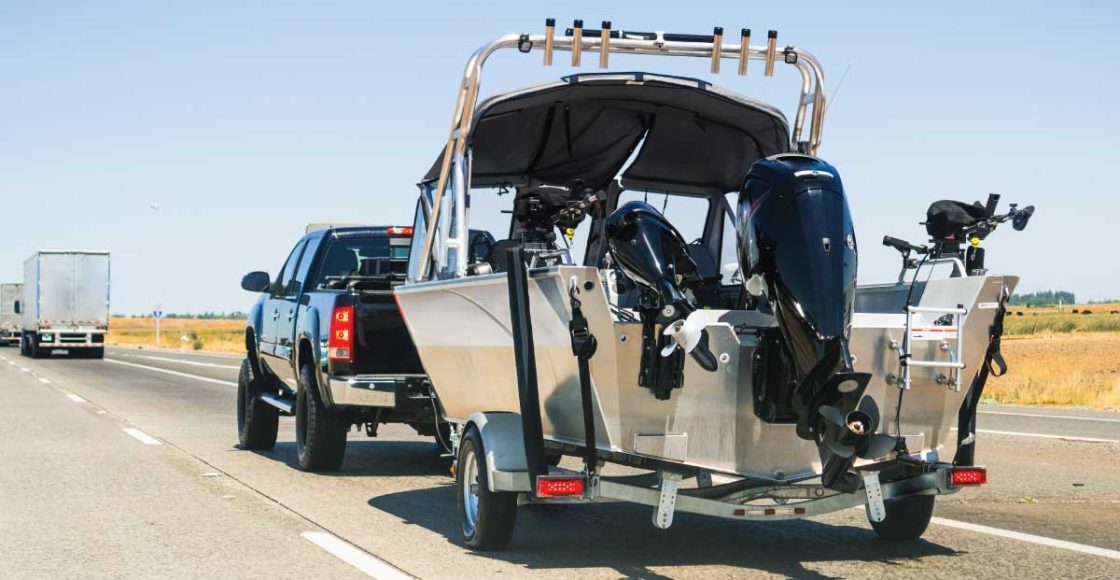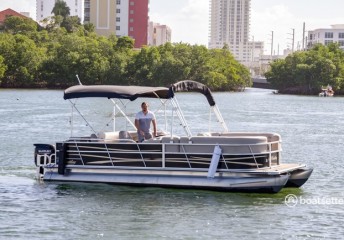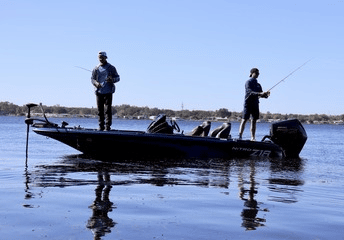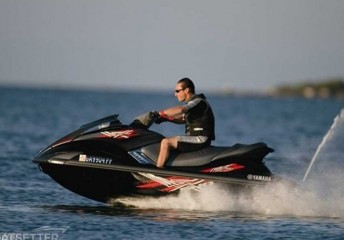Choosing the Best Vehicle to Tow Your Boat
Last Updated on August 11, 2022 by Boatsetter Team
Choosing the best tow vehicle for your boat is a matter of matching the capacity of the vehicle and its trailer hitch to your boat’s weight and trailer. The number of people with you and the amount of gear you bring should also be considered. And of course, budget matters!
Consider the following key factors when determining the best vehicle to tow your boat:
- Determine towing capacity, as outlined by vehicle manufacturer.
- Compare available towing packages.
- Choose the right hitch capacity—most trucks and SUVs are class 3 (8,000 pounds).
- Select the right ball mount.
- Hit the road!
Own a Boat? Rent it out on Boatsetter to earn an avg. of $20K or more per season
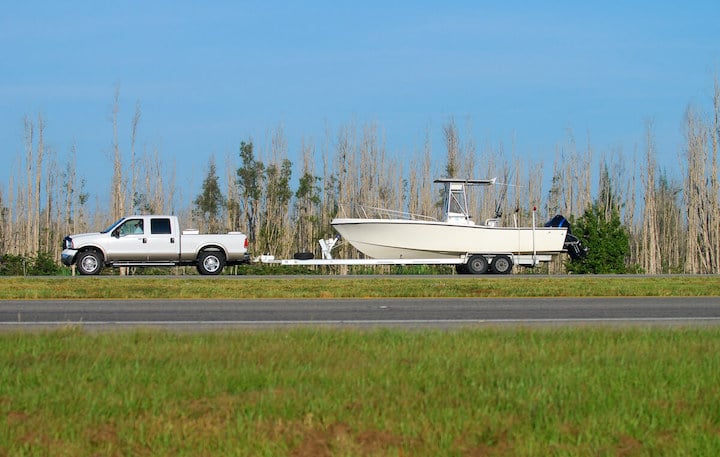
1. Determine towing capacity
Towing capacity is determined by the vehicle manufacturer and takes into account a number of factors.
Your best source of information on towing capacity is the vehicle manual. It specifies the capacity with each available engine, axle ratio option, and indicates which accessory packages require towing. If you don’t have your vehicle owner manual, you may also find this information on the manufacturer’s website, especially for trucks and SUVs.
These are the three towing specs you’ll need to know:
- The GCVW (Gross Combined Vehicle Weight) may be the most important measurement to determine. The GCVW is the weight of the vehicle, its passengers, and its fuel and gear PLUS the weight of your boat (including fuel, water, and gear) on its trailer. The best way to accurately check GCVW is on a public scale at a truck stop or municipal facility. You’ll need to go to the scale with the fuel and gear you’d take to the water.
- The owner’s manual will list the Gross Trailer Weight (GTW) and the maximum trailer weight the vehicle can safely tow. The GTW includes the weight of the boat, trailer, fuel, and gear. Not every boat company publishes the combined weight of its boat and trailer combinations, and the boat’s “dry weight” may not include fuel, batteries, and other gear. To determine the accurate weight of the boat on its trailer, unhitch it and weigh the boat separately on the scale. Vans, compact trucks, and SUVs can usually tow up to 5,000 pounds for a pair of personal watercraft, a small family runabout, or a mid-size fishing boat. Larger boats may require the capacity of a full-size truck or SUV.
- The final spec to consider is Tongue Weight, the amount of weight the loaded trailer tongue is placing on the vehicle hitch. Tongue weight should not exceed the capacity of the vehicle or the hitch. To determine tongue weight, unhitch the trailer so that only the trailer tongue jack is resting on the scale.
For each of these specifications, it’s good practice to use up to 90 percent of the rating. This way you have a safe margin of error.
Of course, if you are buying a boat, it would be good to know that the weight of the boat/trailer combination does not exceed the capacity of your current tow vehicle unless you intend to buy a new one to tow the boat.
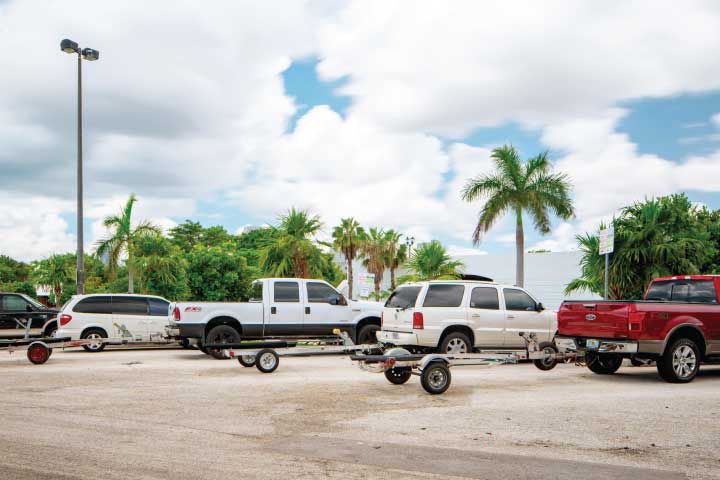
2. Compare towing packages
If you plan to tow your boat a long distance, trucks or SUVs with an optional towing package are probably your best bet. It is in fact beneficial for a vehicle’s durability and performance when towing a longer distance with hilly terrain or through the mountains.
Towing packages may include:
- A heavy-duty cooling system for the engine coolant, the engine oil, and for the transmission;
- Extra-large side mirrors or extendable mirrors;
- A hitch;
- Wiring for trailer lights
Some full-size trucks have a self-leveling suspension that levels the vehicle during towing; however, a towing package may not be necessary if you are only going to tow your boat a few miles to the launch ramp.
3. Choose the right hitch capacity
Tow vehicles require a receiver hitch that may be attached to the vehicle frame or the bumper of a truck. Hitches are rated by capacity in five classes, from Class 1 (2,000-pound trailer weight) to Class 5 (18,000-pound trailer weight).
Most full-size trucks and SUVs have a Class 3 hitch (8,000 pounds). The Class 2 (3,500 pounds) hitch found on compact trucks and SUVs will be adequate for only the lightest boat trailers.
See the website of hitch manufacturer Curt Manufacturing for more information on hitch types and capacity.
4. Select the right ball mount
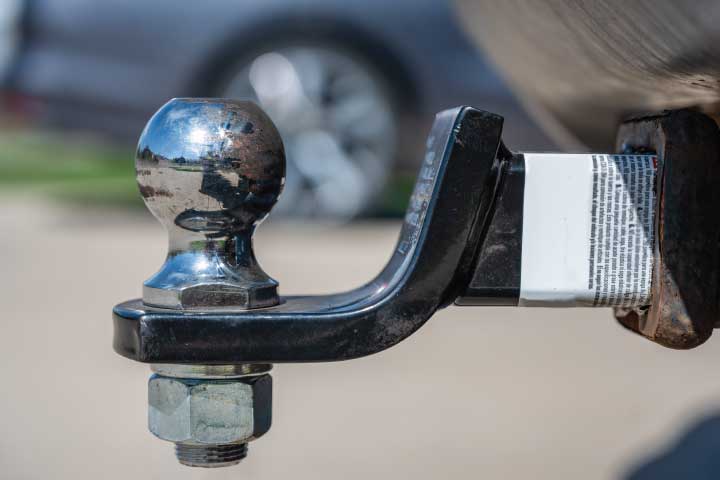
The ball mount is comprised of a shank and a trailer ball platform. The shank inserts into the hitch receiver tube, while the platform provides a solid mounting point for a trailer ball.
The ball mount is secured in the hitch receiver with a hitch pin. Ball mounts have a 2-, 4- or 6-inch drop. You can also flip some ball mounts to raise the height of the ball relative to the vehicle.
- Select a ball mount with the drop or rise that positions the trailer level to the ground.
- If the ball mount is too high, the trailer will push the rear of the vehicle up under braking.
- If the mount’s too low, the trailer will push the vehicle down under braking.
The trailer should be as level as possible for the best vehicle handling and safety.
Ready to hit the road towing your boat?
An excellent tow vehicle will have the rated capacity to handle your crew, gear, boat, and trailer. We assure you that you can confidently head for the water with the right combination of vehicle and hitch!
Boat owners, we’ve got your back with handy guides and tips on handling your vessel. When you’re ready to put your new tow vehicle to work, be sure to read How to Back Up a Boat Trailer.
Don’t let your boat sit idly by – rent it out on Boatsetter to let your boat pay for itself.

Charles Plueddeman is a self-employed writer and photographer based in Wisconsin. A staff editor and contributor to Boating Magazine since 1986, he is the author of its “Off My Dock” column. In the marine realm he specializes in engine technology and trailerable boats. His editorial work has appeared in many national publications, including Popular Mechanics, Men’s Journal, Playboy, Popular Science, Cycle World, and Harley-Davidson Enthuisast.
